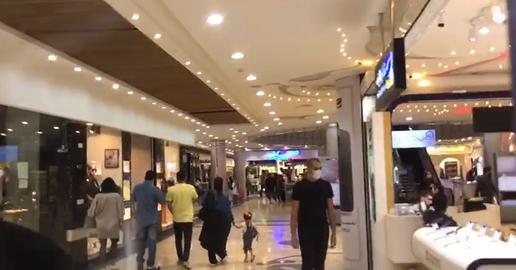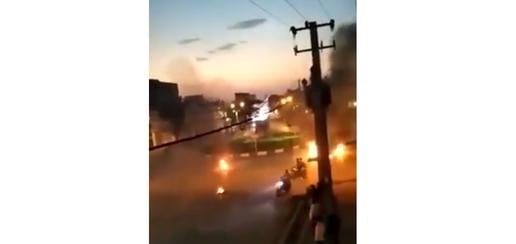Iran’s Coronavirus Taskforce has ordered for non-essential businesses in Tehran and Karaj to close, part of a week-long lockdown to bring a recent spike in Covid-19 cases until control.
The taskforce ordered the lockdown to begin Tuesday, July 20.
Iran is currently experiencing a fifth wave of infections, and it’s the second time during the recent spike that the taskforce has ordered shopkeepers and other businesses to close their doors to customers.
But a citizen journalist going by the name Sajedeh Namdar tells IranWire that some shopkeepers have stopped listening. As with the previous two orders to close, many businesses have stayed open. He talked to shopkeepers and workers to find out what’s been going on.
***
Throughout the pandemic, Iran’s National Anti-Coronavirus taskforce has followed a singular approach when ordering closures and lockdowns, typically giving notice to businesses to close three or four days beforehand, and following up with warnings that those businesses failing to adhere to the rules would face consequences.
For the recent restrictions however, the taskforce changed tack. On Saturday, July 3, it suddenly announced that coronavirus cases had reached a new high and that since Tehran was on “red,” or high, alert, businesses must close the next day. Take-away food outlets and shops and markets selling essential goods were the only businesses exempt.
And yet, on July 4, numerous malls and commercial venues stayed open and failed to change their opening hours or adjust the way they engaged with their customers in any way.
Representatives from the business community say the National Anti-Coronavirus Taskforce and other authorities must take the needs of the people into account. The taskforce orders closures, they say, and then does nothing else for ordinary Iranian citizens.
Merchants and shopkeepers say they have received serious warnings that they should close, and in some cases have been threatened with the permanent closure of their businesses. They said it it's not coronavirus but the protests, in Khuzestan and elsewhere, that triggered the closure of businesses.
Shopkeepers Tell Their Stories
Rahil works in a famous gold shop in a commercial complex in northern Tehran. "Nothing bothers me more than lack of clarity," he said of the recent lockdown. "On Monday, July 19, they announced that we had to close the next day until next Sunday. We appealed as a union but we ended up having no choice but to close the shop."
Part way through telling me about it, Rahil paused, took a deep breath and then said he was embarrassed. "On Tuesday morning, my colleague called and said the mall was open, and that it was no problem to work, unless the police arrived. We went to the shop and re-arranged the window, which took about four hours. On Wednesday morning, our colleagues reported that they had received serious threats from police and other authorities that they would close them down. So we stayed at home.
"On Wednesday, the manager of the floor where gold merchants sell their goods told us the mall would be open the next day and that we could make our own decision about whether to open or not. Of course, the shopkeepers are responsible for any fines and have to deal with any threats. I am a day laborer and we only get paid for the days I work. That's why I'm not happy about the closings. I really don’t know how long this situation will last."
The number of people using public transport suggests not everything that should have been closed was. “In line with the National Anti-Coronavirus Taskforce’s decision to close for six days, the Tehran Metro was supposed to operate at a lower capacity," Majid Rostami, deputy director of operations for the Tehran and Suburbs Metro Company, told the Khabarban news website. "However, due to the crowds on Tuesday, July 20, it became clear that many guilds and private companies were not complying with the headquarters' directive. Therefore, except for Wednesday, July 21, which was Eid al-Adha, and Friday July 23, the Tehran metro will continue to operate at full capacity."
I also talked to Erfan, who sells perfumes. "For me, this is nothing but trouble and hardship," he said of the closure of shops. "The owner handed over the shop to me, but with the current situation of restrictions relaxing and then tightening again, on the floor I work on, out of 35 shops, only five shops were open today.
"Every morning when I wake up, I try to have positive energy; I tell myself things will get better. But every day there’s a new problem, and I’m stressed for the rest of day. I am really getting fed up. I might just stop altogether."
Alireza runs a suit shop in a mall in central Tehran. "Our mall was open on the first day, but the police arrived and threatened to shut it down so we had to close," he said. "On Wednesday, all the vendors protested to the management. They said all the malls in the north of the city, from Ghaem to Heravi, are open, so why should we close? These same pressures prompted the management to announce on Telegram on Wednesday that the mall was open and merchants can open their shops if they wish. They also stated that the mall management held no responsibility for any fines shopkeepers incurred, or if the shops were forced to close.”
Alireza provided further context: "Our trouble started in March 2020, when we were not allowed to run a full market in the run-up to the new year. We had trouble paying our bills and that was the case for seven or eight months. In November 2020 I had to borrow 250 million tomans at high interest and then bought goods for the shop hoping that the next new year period would compensate. But this time the pandemic shutdown started in January. The interest rate increases every month. It’s a mess, a real mess."
He holds his head in his hands and, after a moment of silence, continues: "We have become indifferent. Why should the government force me to do something so easily? I have been getting poorer every day for two years, and am working harder and harder all the time. I am on the verge of collapse. But I do not even dare to protest.
“We had a year and a half of closures. Two weeks ago, people did not even know the shops were open. Our sales were a quarter of what they used to be. As soon as it started to pick up, it started all over again. They announced that we had to close. We have stayed open today and it is going well up to now, but who knows what will happen.”
This article was written by a citizen journalist in Tehran using a pseudonym.
Watch: An IranWire citizen journalist’s {{ __192222_videocomponent__video component__ }}">footage of one Tehran mall
Related Coverage:
Tehran Shopkeepers Stay Open in Defiance of Latest Covid-19 Lockdown
Keyvan Samimi: The Streets are the Only Way for Striking Iranian Workers
Iran's Deserted Polling Stations: Citizens Report Their On-the-Ground Experiences
Iranian Parliament Drafts Bill to Outlaw Citizen Journalists
More Work for Less Pay: Meet the Female Rice Paddy Farmers of Gilan
visit the accountability section
In this section of Iran Wire, you can contact the officials and launch your campaign for various problems

























comments